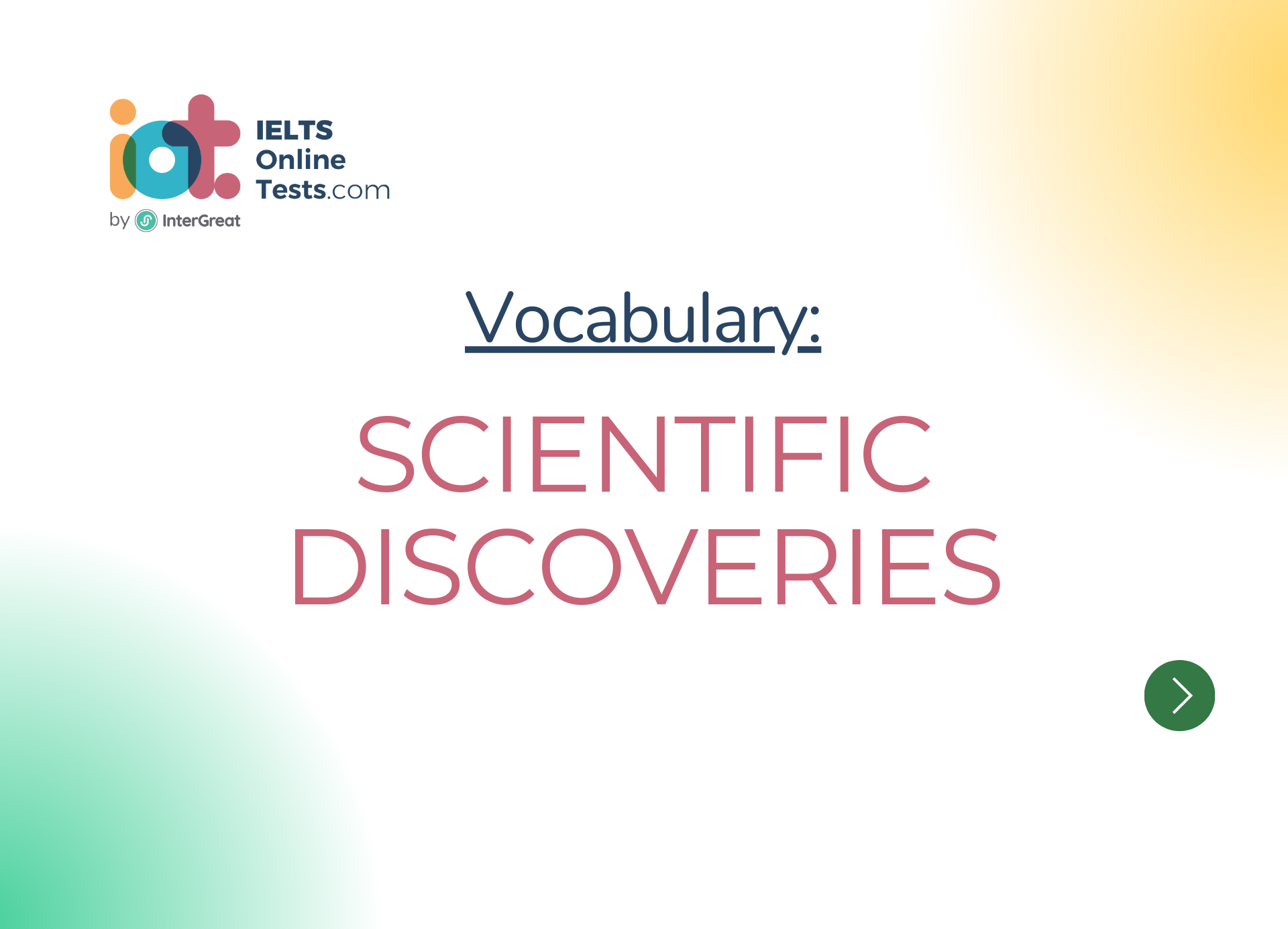
Scientific discoveries
Here are some vocabulary words related to scientific discoveries for the IELTS band score range of 4.5-6.0:
Innovation:
The introduction of new ideas, methods, or technologies that lead to significant advancements.
Breakthrough:
A major discovery or development that represents a significant step forward in scientific knowledge.
Research:
The systematic investigation of a topic to gain new knowledge or understanding.
Experiment:
A controlled procedure designed to test a hypothesis or validate a scientific theory.
Hypothesis:
A proposed explanation or prediction that can be tested through experimentation.
Observation:
The act of closely monitoring or examining something to gather data or information.
Evidence:
Facts, data, or information that support or refute a scientific claim or hypothesis.
Theory:
A well-substantiated explanation of some aspect of the natural world that is based on empirical evidence and has withstood repeated testing.
Phenomenon:
A rare, remarkable, or observable event or occurrence that requires scientific investigation.
Discovery:
The act of finding or uncovering something previously unknown or hidden.
Invention:
The creation of a new device, process, or technique that provides a practical solution to a problem.
Experimentation:
The process of conducting scientific tests or trials to collect data and validate hypotheses.
Analysis:
The examination and evaluation of data or evidence to draw conclusions or make interpretations.
Empirical:
Based on observation, experience, or experimentation rather than theory or pure logic.
Scientific Method:
A systematic approach to scientific research that involves making observations, formulating hypotheses, conducting experiments, and drawing conclusions.
Peer Review:
The evaluation of scientific work by experts in the same field to ensure its quality and validity.
Data:
Facts, figures, or information collected during experiments or research.
Conclusion:
The final result or outcome drawn from the analysis of data or experimentation.
Publication:
The process of presenting scientific findings in journals or other academic platforms.
Replication:
The repetition of scientific experiments by different researchers to validate or refute previous findings.
Valid:
Well-founded, sound, and based on logical reasoning and evidence.
Invalid:
Not well-founded or based on flawed reasoning or insufficient evidence.
Experiment Design:
The planning and organization of an experiment to ensure accurate and reliable results.
Control Group:
A group in an experiment that does not receive the experimental treatment, used as a standard for comparison.
Variables:
Factors or conditions that can be changed or controlled in an experiment.
Bias:
Prejudice or favoritism that may influence the outcome of an experiment or study.
Confirmation Bias:
The tendency to favor information that confirms one's preexisting beliefs or hypotheses.
Data Analysis:
The process of examining and interpreting data to uncover patterns or relationships.
Statistical Significance:
The likelihood that the observed results in an experiment are not due to chance.
Empirical Evidence:
Evidence that is based on direct observation or experience rather than theory.
Research Paper:
A written document that presents the findings and analysis of a research study.
Scientific Journal:
A publication that contains articles on scientific research and discoveries.
Peer-Reviewed Journal:
A scientific journal where articles are reviewed by experts in the field before publication.
Scientist:
A person who conducts scientific research and studies the natural world.
Lab:
A controlled environment where scientific experiments and research are conducted.
Microscope:
An instrument used to magnify and observe tiny objects or organisms.
Chemical Reaction:
The process by which substances undergo chemical changes, resulting in the formation of new substances.
Genetic Mutation:
A permanent alteration in the DNA sequence of an organism.
Theoretical Model:
An abstract representation or framework used to explain a scientific phenomenon.
Peer Collaboration:
The cooperation and exchange of ideas among scientists in the same field.
Scientific Conference:
A gathering where researchers present and discuss their latest scientific findings.
Laboratory Equipment:
Instruments and tools used in scientific experiments and research.
Scientific Community:
The collective body of scientists and researchers engaged in scientific inquiry.
Deductive Reasoning:
A logical process of drawing conclusions based on general principles or premises.
Inductive Reasoning:
A logical process of drawing general conclusions from specific observations or evidence.
Replicable Results:
Findings from an experiment that can be reproduced by other researchers.
Research Funding:
Financial support provided to scientists and research projects.
Natural Sciences:
Scientific disciplines that study the natural world, including physics, chemistry, biology, and astronomy.
Social Sciences:
Scientific disciplines that study human behavior and societies, such as sociology, psychology, and anthropology.
Life Sciences:
Scientific disciplines that study living organisms and their biological processes.
Remember to practice using these words in sentences and contexts to improve your language skills. Learning vocabulary related to technological advancements will not only be useful for the IELTS exam but also in staying updated with the ever-evolving world of technology. Keep up the good work in your language learning journey!




